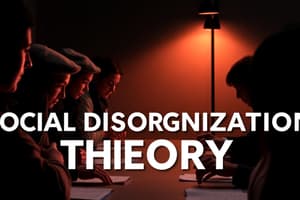Podcast
Questions and Answers
Which of these options are correct? (Select all that apply) The primary focus of criminology as a field of study is:
Which of these options are correct? (Select all that apply) The primary focus of criminology as a field of study is:
- Breaking of Laws: When an individual or group does something that goes against the rules set by the government or authority. (correct)
- Reaction toward the breaking of laws: Punishing the offender from committing a crime. The way communities, governments, and individuals respond when laws are broken. (correct)
- Making of laws: The process through which rules or regulations are created by governments or other authorities to guide behavior in society. (correct)
What is the aim in studying criminology?
What is the aim in studying criminology?
- To develop theories and principles that explain crime.
- To prevent the occurrence of crime. (correct)
- To understand the criminal justice system.
Why is studying criminology important for the profession of lawyers?
Why is studying criminology important for the profession of lawyers?
It helps them to understand the mindset of criminals.
What is criminology defined as?
What is criminology defined as?
What is considered the most dangerous type of criminals?
What is considered the most dangerous type of criminals?
What is the definition of criminal etiology?
What is the definition of criminal etiology?
Internal acts (such as the inception of the intention to commit a crime in the mind of a person) are punishable under the law.
Internal acts (such as the inception of the intention to commit a crime in the mind of a person) are punishable under the law.
Which of these are considered disciplines involved in the collection of knowledge about criminal action?
Which of these are considered disciplines involved in the collection of knowledge about criminal action?
What are the three primary causes of crime according to the Positivist school of thought? (Select all that apply)
What are the three primary causes of crime according to the Positivist school of thought? (Select all that apply)
The Positivist school of thought argues that a crime prevention strategy focusing solely on harsher punishments is sufficient to address crime.
The Positivist school of thought argues that a crime prevention strategy focusing solely on harsher punishments is sufficient to address crime.
The Neo-classical school introduces the idea that certain individuals, such as children or lunatics, cannot be held fully responsible for their actions.
The Neo-classical school introduces the idea that certain individuals, such as children or lunatics, cannot be held fully responsible for their actions.
Which approach to crime prevention is more useful in reducing social conflicts and improving environmental conditions?
Which approach to crime prevention is more useful in reducing social conflicts and improving environmental conditions?
What is the Endemic approach to crime?
What is the Endemic approach to crime?
What is the Organic Psychosis approach to crime?
What is the Organic Psychosis approach to crime?
Which approach to crime focuses on the 'internal factors' of criminals?
Which approach to crime focuses on the 'internal factors' of criminals?
Which approach to crime focuses on the 'external factors' of criminals?
Which approach to crime focuses on the 'external factors' of criminals?
What is meant by the 'Lack of Probity' approach to criminality?
What is meant by the 'Lack of Probity' approach to criminality?
What is meant by the 'Lack of Piety' approach to criminality?
What is meant by the 'Lack of Piety' approach to criminality?
Which approach to crime is more relevant for the offender from poverty?
Which approach to crime is more relevant for the offender from poverty?
Which approach to crime is more relevant for the offender with mental illness?
Which approach to crime is more relevant for the offender with mental illness?
Which approach emphasizes that individuals act within reason and choose among alternatives of action using conscious thought?
Which approach emphasizes that individuals act within reason and choose among alternatives of action using conscious thought?
What is the concept of crime defined as according to legal definitions?
What is the concept of crime defined as according to legal definitions?
Which of the following is considered a 'Misdemeanor'?
Which of the following is considered a 'Misdemeanor'?
Criminal Law governs matters related to family relations, property, succession, and contracts.
Criminal Law governs matters related to family relations, property, succession, and contracts.
Jurisprudence refers to crimes that are inherently evil.
Jurisprudence refers to crimes that are inherently evil.
The Philippine Constitution is considered the highest law of the land.
The Philippine Constitution is considered the highest law of the land.
What is the role of the Legislative Branch in the government?
What is the role of the Legislative Branch in the government?
What is the role of the Executive Branch in the government?
What is the role of the Executive Branch in the government?
What is the role of the Judicial Branch in the government?
What is the role of the Judicial Branch in the government?
What is the supreme law in the Philippines?
What is the supreme law in the Philippines?
If a local government enacts an ordinance that contradicts the Philippine Constitution, which law should take precedence?
If a local government enacts an ordinance that contradicts the Philippine Constitution, which law should take precedence?
Which of these are important elements of a crime? (Select all that apply)
Which of these are important elements of a crime? (Select all that apply)
Flashcards
Organized Crime
Organized Crime
The most dangerous type of crime, often involving groups coordinating illegal activities.
Criminology
Criminology
The study of crime as a social phenomenon, including the making of laws, breaking of laws, and the reaction to law-breaking.
Sociology of Law
Sociology of Law
The study of how laws affect society and why certain behaviors are considered crimes.
Criminal Etiology
Criminal Etiology
Signup and view all the flashcards
Multidisciplinary Approach
Multidisciplinary Approach
Signup and view all the flashcards
Theory
Theory
Signup and view all the flashcards
Speculative Theory
Speculative Theory
Signup and view all the flashcards
Hypothesis
Hypothesis
Signup and view all the flashcards
Social Media Data (Criminology)
Social Media Data (Criminology)
Signup and view all the flashcards
Positivist School
Positivist School
Signup and view all the flashcards
Neo-Classical School
Neo-Classical School
Signup and view all the flashcards
Classical School
Classical School
Signup and view all the flashcards
Crime
Crime
Signup and view all the flashcards
Felony
Felony
Signup and view all the flashcards
Misdemeanor
Misdemeanor
Signup and view all the flashcards
Economic Approach (Crime)
Economic Approach (Crime)
Signup and view all the flashcards
Demographic Approach (Crime)
Demographic Approach (Crime)
Signup and view all the flashcards
Epidemiological/Sociological Approach (Crime)
Epidemiological/Sociological Approach (Crime)
Signup and view all the flashcards
Biological Approach (Crime)
Biological Approach (Crime)
Signup and view all the flashcards
Ecological Approach (Crime)
Ecological Approach (Crime)
Signup and view all the flashcards
Study Notes
Criminology Introduction
- Criminology is the study of crime as a social phenomenon
- Organized crime is the most dangerous type
- Focuses on making laws, breaking laws, and reacting to them
- Criminology is a multidisciplinary field, involving psychology, sociology, anthropology, biology, neurology, political science, and economics.
- Aim of studying Criminology: preventing crime
- Theory: scientific principles to explain crime.
- Speculative theory: observes high crime rate in areas with low employment and hypothesizes that economic conditions influence criminal behavior
- Role for a hypothesis: make predictions testable through experiments
- Social media data in criminology: rich source of info, easily collected, insights into criminal ideas and networks
- Schools of thought in criminology
- Positivist School: Biological, Psychological, or Sociological causation for crime. Crime is attributed to social and environmental factors. Hardship leads to crime; punishments aren't enough.
- Neo-Classical School: Individuals (like children or mentally ill) aren't fully responsible for their actions; considers mental capacity when sentencing.
Crime Definition and Classification
- Crime: act or omission punishable by law
- Felony: serious crime, punishable under the Revised Penal Code
- Offense: punishable under special laws
- Misdemeanor: violation of simple rules/regulations (less serious offenses)
- Classification of crime (Categories)
- Type A, B, C, D, E, F, and G, depending on criteria like intent, place, time and motive
Different Approaches to Explain Crime
- Economic Approach: Poverty, lack of resources, inequality causing criminal behavior.
- Demographic Approach: Population density, age, income, impacting social behaviors, like crime.
- Epidemiological and Sociological Approach: Social interactions are factors in criminal behavior.
- Biological Approach: Genetic factors linked to criminal behavior.
- Ecology Approach: Crime prevention strategies by reducing conflicts and improving conditions.
- Endemic Approach: Factors arising from local conditions, seasons, or specific areas.
- Organic Psychosis Approach: Mental health issues are linked to criminal behavior.
- Objective Approach: External factors (social, sociological, cultural, economic)
- Subjective Approach: Internal factors (within the criminal)
Criminal Law and Civil Law
- Criminal Law: Branch of public law defining crimes and punishments.
- Civil Law: Governs family relations, property, succession, and contracts.
- Jurisprudence: Theoretical framework for interpreting/understanding law.
- Mala in se: Inherently evil crimes
- Mala prohibita: Crimes due to laws prohibiting them, not inherently evil
Three Branches of Government & Constitutional Interpretation
- Three branches of government: Legislative (makes laws), Executive (enforces laws), Judicial (interprets laws).
- Constitutional interpretation: the Constitution is supreme law; judicial decisions interpret/apply it.
- Local ordinance conflict with Constitution: local ordinances are declared unconstitutional if they contradict the Constitution.
Studying That Suits You
Use AI to generate personalized quizzes and flashcards to suit your learning preferences.





